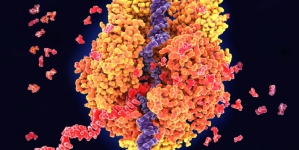-
WASHINGTON: India Now Second-Largest Source Country For New Citizens In US- Report - 1 day ago
-
LONDON: Indian-Origin Teen In UK Gets “Life-Changing” Cancer Treatment - April 25, 2024
-
SILICON VALLEY: All About Pavan Davuluri, New Head Of Microsoft Windows - April 25, 2024
-
LONDON: UK’s India Gate To Commemorate Role Of Indian Soldiers From World Wars - April 24, 2024
-
HARARE: Shri Bramha Kumar appointed as the next Ambassador of India to the Republic of Zimbabwe - April 23, 2024
-
LONDON: Indian-Origin Principal Wins UK Legal Challenge Over School Prayer Ban - April 23, 2024
-
TORONTO: Indian-Origin Doctor Needs ₹ 2 Crore For Legal Fees. Elon Musk Responds - April 22, 2024
-
KINSHASA: India-Democratic Republic of Congo Foreign Office Consultations - April 21, 2024
-
LONDON: UK Court Allows Sale Of Nirav Modi’s Luxury London Apartment - April 21, 2024
-
TEHRAN: Travel advisory for Iran and Israel - April 20, 2024
PARIS: Scientists develop chip to deliver COVID-19 test results on smartphone
PARIS: Scientists have developed a
stamp-sized chip that simplifies Covid-19 testing and delivers results on a smartphone
in less than 55 minutes.
The microfluidic chip developed by researchers from Rice University in the US
measures the concentration of SARS-CoV-2 nucleocapsid (N) protein, a biomarker
for Covid-19, in blood serum from a standard finger prick.
According to the research published in the journal ACS Sensors, the nanobeads
bind to SARS-CoV-2 N protein in the chip and transport it to an electrochemical
sensor that detects minute amounts of the biomarker.
The researchers noted that their process simplifies sample handling compared to
swab-based PCR tests that are widely used to diagnose Covid-19 and need to be
analysed in a laboratory.
“What’s great about this device is that it doesn’t require a
laboratory,” said Rice lab of mechanical engineer Peter Lillehoj.
“You can perform the entire test and generate the results at the
collection site, health clinic or even a pharmacy. The entire system is easily
transportable and easy to use,” he said in a statement.
The team, including Rice graduate student and lead author Jiran Li, took
advantage of existing biosensing tools to develop simple diagnostics, like a
microneedle patch introduced last year to diagnose malaria.
The new tool relies on a slightly more complex detection scheme but delivers
accurate, quantitative results in a short amount of time.
To test the device, the researchers relied on donated serum samples from people
who were healthy and others who were Covid-19-positive.
They said a longer incubation yields more accurate results when using whole
serum.
The team found that 55 minutes was an optimum amount of time for the microchip
to sense SARS-CoV-2 N protein at concentrations as low as 50 picograms
(billionths of a gram) per millilitre in whole serum.
The microchip could detect N protein in even lower concentrations, at 10
picograms per milliliter, in only 25 minutes by diluting the serum fivefold.
Paired with a Google Pixel 2 phone and a plug-in potentiostat — a device that
controls voltage and measures resulting current — it was able to deliver a
positive diagnosis with a concentration as low as 230 picograms for whole
serum.
“There are standard procedures to modify the beads with an antibody that
targets a particular biomarker,” Lillehoj said.
“When you combine them with a sample containing the biomarker, in this
case SARS-CoV-2 N protein, they bond together,” he added.
A capillary tube is used to deliver the sample to the chip, which is then
placed on a magnet that pulls the beads towards an electrochemical sensor
coated with capture antibodies.
The beads bind to the capture antibodies and generate a current proportional to
the concentration of biomarker in the sample.
The potentiostat reads that current and sends a signal to its phone app.
























